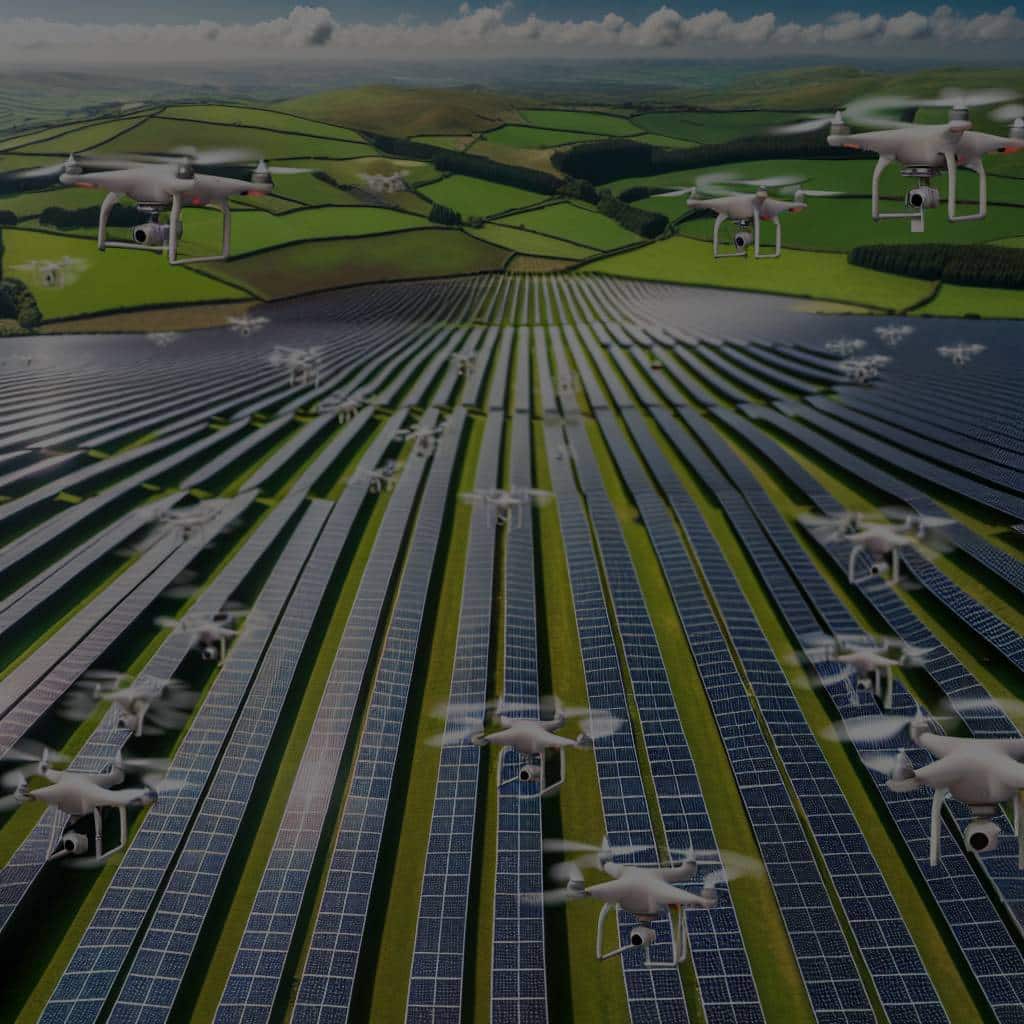Can Drone Technology Enhance Efficiency in UK Large-Scale Solar Farms?

The integration of advanced technologies continues to transform various sectors around the globe. One particular area that has seen significant technological strides is the renewable energy sector, more precisely, solar energy. It’s imperative to underline the growing utility of drone technology in enhancing the efficiency of solar farms. In the context of the UK, where solar energy is a key component of the renewable energy mix, the incorporation of drone technology could yield substantial benefits, especially in large-scale solar farms.
The Role and Benefits of Drones in Solar Panel Inspections
The integration of drones into solar farm systems is not a novel concept; nonetheless, its potential remains largely untapped. One crucial role that drones can play in solar farms is the inspection of solar panels. Regular inspections are central in ensuring the maintenance and efficiency of the solar farms. Traditionally, these inspections have been done manually, consuming a significant amount of time and effort. However, drones, specifically the DJI models known for their advanced capabilities, can inspect large areas rapidly and efficiently.
A découvrir également : How Can UK Art Galleries Promote Online Sales through Virtual Exhibitions?
DJI drones equipped with high-resolution cameras and thermal imaging technology can detect anomalies or defects in solar panels that could affect energy generation. This data garnered is not only precise but also comprehensive, proving invaluable in the maintenance and troubleshooting process. Moreover, the speed and ease of drone-based inspections allow for frequent checks, ensuring that any issues are detected and resolved promptly, further enhancing the efficiency of the solar farms.
Solar Farm Efficiency Gains through Drones
Efficiency is paramount in any power generation system. It is the cog that determines the viability and profitability of the project. In the case of solar farms, efficiency is determined by the amount of solar energy converted to electricity and how much of this power reaches the end-user. Drone technology can substantially boost this efficiency in a couple of ways.
Lire également : How to Design a User-Friendly Interface for an Elderly-Focused UK Health App?
To start with, the DJI drones can map out solar farms using GPS technology. This geospatial data can help in planning and optimizing the layout of the solar panels, maximizing sun exposure and reducing energy losses. The rapid and precise nature of drone-based data gathering trumps traditional methods, saving both time and money.
Solar energy production is also usually affected by dirt and dust build-up on solar panels, which reduces their efficiency. Drone technology can be used in the cleaning of solar panels, thus increasing energy production.
The Role of Drones in Solar Farm Maintenance
Maintenance is another area where drones can make a significant contribution. The data collected by drones during inspections can help in predictive maintenance, identifying potential issues before they morph into costly repairs.
Drones equipped with thermal imaging technology can discern hot spots in panels, which indicates a malfunction. Such panels can be replaced or repaired before they affect the overall performance of the farm.
Drone technology also provides a safer and more efficient alternative for routine maintenance tasks. For instance, drones can be used to clean panels, a task that would otherwise require manual labor and considerable time.
The Scholarly Perspective on Drone Technology in Solar Farms
In academia, scholars have also recognized the potential of drone technology in enhancing the efficiency of solar farms. A variety of studies have explored different aspects of this technology’s application in the solar energy sector.
For instance, scholars have discussed the role of drones in assessing solar farm sites before construction. Drone-based data can help in determining the most suitable sites for solar farms, considering factors such as solar radiation levels and geographical features.
Additionally, the capacity of drones to gather and analyze data in real time has been explored. This capability can be pivotal in optimizing the performance of solar farms, allowing for instantaneous adjustments based on the data collected.
The consensus among scholars is clear: drone technology holds immense potential in enhancing the efficiency and profitability of solar farms.
The Future of Drone-Based Solar Farm Management
Looking forward, the integration of drone technology in solar farm management is likely to become more widespread. As drone technology continues to advance, and as more solar farms appreciate the benefits of this technology, its use will undoubtedly proliferate.
In the UK, where the government has committed to ambitious renewable energy targets, drone technology could play a key role in achieving these goals. By enhancing the efficiency of solar farms, more clean energy can be produced and delivered to consumers, thereby contributing to the country’s energy sustainability goals.
However, it is imperative to address any regulatory or technical challenges that could hamper the full deployment of this technology. Stakeholders must collaborate in creating conducive regulatory frameworks and in advancing the technology to ensure its efficacy and applicability in solar farm management.
Drone Training and Regulatory Frameworks
In order to fully exploit the potential of drone technology in managing large-scale solar farms, there is a need for proper drone training and the creation of suitable regulatory frameworks. Drone training is essential in ensuring that operators can effectively control the drones, interpret the collected data and respond appropriately to any anomalies detected in the solar panels.
Training in drone operation can be provided by various institutions and organizations. For instance, DJI, a leading manufacturer of drones, provides training programs for users of its products, such as the DJI Matrice and DJI Zenmuse. These training programs equip users with the necessary skills to operate these advanced drones and make the most out of their features.
In addition to training, there is also a need for appropriate regulatory frameworks to guide the use of drones in solar farm management. Regulations should address issues such as the safety of drone operations, data security, and the privacy of surrounding areas.
In the UK, the regulatory framework for drone use is managed by the Civil Aviation Authority (CAA). The CAA provides guidelines on drone use, including the requirement for a drone operator licence for commercial use. However, as drone technology advances and its application in the solar industry becomes more extensive, there may be a need to update these regulations to accommodate these changes.
Conclusion: The Future of Drone Technology in UK’s Solar Industry
In conclusion, the application of drone technology in the UK’s solar industry is poised to bring substantial benefits. From enhancing the efficiency of solar panel inspections to improving solar farm layout for optimized energy generation, drones can contribute significantly to the growth and profitability of the solar industry.
Google Scholar reveals numerous scholarly articles supporting the integration of drone technology in solar farms. These studies provide further evidence of the capacity of drones to enhance the efficiency of solar farms through real-time data collection, predictive maintenance, and instantaneous adjustments based on collected data.
However, full integration of this technology will require concerted efforts from various stakeholders. Drone training programs need to be established to equip operators with the necessary skills. At the same time, regulatory frameworks need to be updated to address the unique challenges and opportunities presented by drone technology.
The UK government’s commitment to achieving ambitious renewable energy targets provides a conducive environment for the deployment of advanced technologies such as drones. As such, the future of drone technology in the UK’s renewable energy sector, particularly in large-scale solar farms, looks promising.
